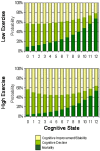Changes in cognition and mortality in relation to exercise in late life: a population based study
- PMID: 18769616
- PMCID: PMC2518854
- DOI: 10.1371/journal.pone.0003124
Changes in cognition and mortality in relation to exercise in late life: a population based study
Abstract
Background: On average, cognition declines with age but this average hides considerable variability, including the chance of improvement. Here, we investigate how exercise is associated with cognitive change and mortality in older people and, particularly, whether exercise might paradoxically increase the risk of dementia by allowing people to live longer.
Methods and principal findings: In the Canadian Study of Health and Aging (CSHA), of 8403 people who had baseline cognition measured and exercise reported at CSHA-1, 2219 had died and 5376 were re-examined at CSHA-2. We used a parametric Markov chain model to estimate the probabilities of cognitive improvement, decline, and death, adjusted for age and education, from any cognitive state as measured by the Modified Mini-Mental State Examination. High exercisers (at least three times per week, at least as intense as walking, n = 3264) had more frequent stable or improved cognition (42.3%, 95% confidence interval: 40.6-44.0) over 5 years than did low/no exercisers (all other exercisers and non exercisers, n = 4331) (27.8% (95% CI 26.4-29.2)). The difference widened as baseline cognition worsened. The proportion whose cognition declined was higher amongst the high exercisers but was more similar between exercise groups (39.4% (95% CI 37.7-41.1) for high exercisers versus 34.8% (95% CI 33.4-36.2) otherwise). People who did not exercise were also more likely to die (37.5% (95% CI 36.0-39.0) versus 18.3% (95% CI 16.9-19.7)). Even so, exercise conferred its greatest mortality benefit to people with the highest baseline cognition.
Conclusions: Exercise is strongly associated with improving cognition. As the majority of mortality benefit of exercise is at the highest level of cognition, and declines as cognition declines, the net effect of exercise should be to improve cognition at the population level, even with more people living longer.
Conflict of interest statement
Figures





Similar articles
-
Modeling the impact of sex on how exercise is associated with cognitive changes and death in older Canadians.Neuroepidemiology. 2009;33(1):47-54. doi: 10.1159/000211953. Epub 2009 Apr 8. Neuroepidemiology. 2009. PMID: 19365142
-
Impact of exercise in community-dwelling older adults.PLoS One. 2009 Jul 8;4(7):e6174. doi: 10.1371/journal.pone.0006174. PLoS One. 2009. PMID: 19584926 Free PMC article.
-
Calcium-channel blockers and cognitive function in elderly people: results from the Canadian Study of Health and Aging.CMAJ. 1999 Sep 7;161(5):501-6. CMAJ. 1999. PMID: 10497605 Free PMC article.
-
Exercise programs for people with dementia.Cochrane Database Syst Rev. 2013 Dec 4;(12):CD006489. doi: 10.1002/14651858.CD006489.pub3. Cochrane Database Syst Rev. 2013. Update in: Cochrane Database Syst Rev. 2015 Apr 15;(4):CD006489. doi: 10.1002/14651858.CD006489.pub4 PMID: 24302466 Updated. Review.
-
Folic acid with or without vitamin B12 for cognition and dementia.Cochrane Database Syst Rev. 2003;(4):CD004514. doi: 10.1002/14651858.CD004514. Cochrane Database Syst Rev. 2003. Update in: Cochrane Database Syst Rev. 2008 Oct 08;(4):CD004514. doi: 10.1002/14651858.CD004514.pub2 PMID: 14584018 Updated. Review.
Cited by
-
Association between cardiorespiratory fitness and cerebrovascular reactivity to a breath-hold stimulus in older adults: influence of aerobic exercise training.J Appl Physiol (1985). 2022 Jun 1;132(6):1468-1479. doi: 10.1152/japplphysiol.00599.2021. Epub 2022 Apr 28. J Appl Physiol (1985). 2022. PMID: 35482329 Free PMC article. Clinical Trial.
-
Transitions in frailty status in older adults in relation to mobility: a multistate modeling approach employing a deficit count.J Am Geriatr Soc. 2011 Mar;59(3):524-9. doi: 10.1111/j.1532-5415.2011.03300.x. J Am Geriatr Soc. 2011. PMID: 21391943 Free PMC article.
-
Reversal of glial and neurovascular markers of unhealthy brain aging by exercise in middle-aged female mice.PLoS One. 2011;6(10):e26812. doi: 10.1371/journal.pone.0026812. Epub 2011 Oct 25. PLoS One. 2011. PMID: 22046366 Free PMC article.
-
Can volunteering in later life reduce the risk of dementia? A 5-year longitudinal study among volunteering and non-volunteering retired seniors.PLoS One. 2017 Mar 16;12(3):e0173885. doi: 10.1371/journal.pone.0173885. eCollection 2017. PLoS One. 2017. PMID: 28301554 Free PMC article.
-
Physical activity predicts reduced plasma β amyloid in the Cardiovascular Health Study.Ann Clin Transl Neurol. 2017 Apr 14;4(5):284-291. doi: 10.1002/acn3.397. eCollection 2017 May. Ann Clin Transl Neurol. 2017. PMID: 28491896 Free PMC article.
References
-
- Rockwood K, Middleton L. Physical activity and the maintenance of cognitive function: Epidemiology. Alzheimer Dement. 2007;3(2):S38–S44. - PubMed
-
- Broe GA, Creasy H. Health habits and risk of cognitive impairment and dementia in old age: A prospective study on the effects of exercise, smoking and alcohol consumption. Aust NZ J Public Health. 1998;22(5):621–3. - PubMed
-
- Kramer AF, Erickson KI. Effects of physical activity on cognition, well-being, and brain: Human interventions. Alzheimers Dement. 2007;3(2):S45–S51. - PubMed
-
- Cotman CW, Berchtold NC, Christie LA. Exercise builds brain health: key roles of growth factor cascades and inflammation. Trends Neurosci. 2007;30(9):464–72. - PubMed
-
- Kay DWK. Impairment, disability and dementia. Int J Geriatric Psychiatry. 1991;6:827–31.
Publication types
MeSH terms
LinkOut - more resources
Full Text Sources
Medical
Research Materials

